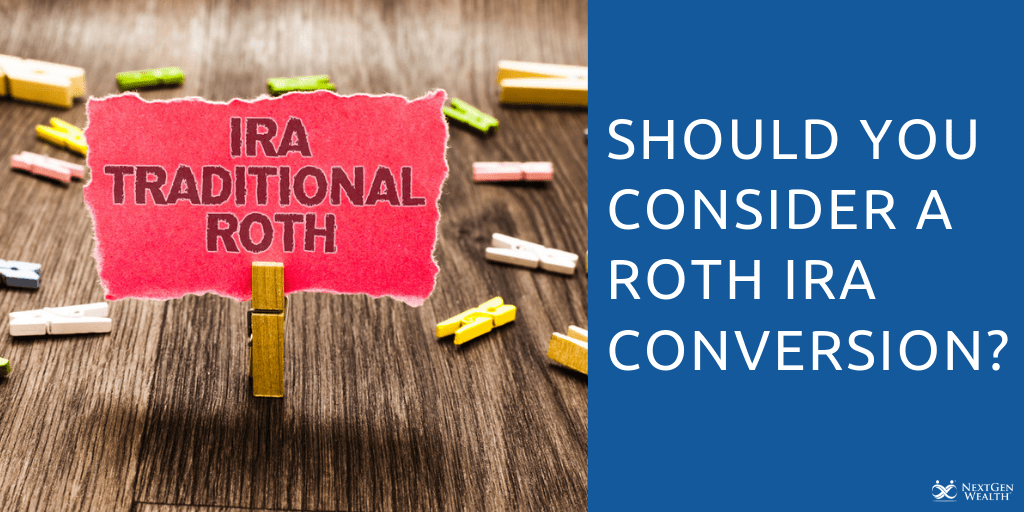Should You Consider a Roth IRA Conversion?
If you’re looking to minimize taxes in retirement, or anytime before, one of the options is converting your traditional individual retirement account (IRA) into a Roth IRA. This shifts the tax burden from a future date to the present day. Before you make such a move, though, it’s important to consider what this will mean to your finances.
Minimizing taxes in retirement seems very appealing. Once you stop working, your income in retirement will come in part from your savings so the less taxes you can pay, the more money you will have available for enjoying your life.
However, is this the right move for you? Below are some important considerations to take into account before making a Roth IRA conversion. We’ll also cover how to convert an existing retirement account into a Roth.
What is a Roth IRA Conversion?
When you turn a before-tax account into an after-tax account – i.e. a traditional IRA to a Roth IRA – this is called a conversion. This option was introduced by the federal government in 2010 and gave investors a new tool that could potentially minimize taxes in retirement.
Before this option was introduced, the only way to invest in a Roth IRA was to get your modified adjusted gross income (MAGI) to fall below a certain limit. While the annual Roth contribution limit is still in place, the conversion option allows high-income individuals to take advantage of the benefits of Roth IRAs.
As an example, if you are married filing jointly and your MAGI is less than $203,000, you can contribute to a Roth IRA. However, if your income is higher, you are not eligible. With the new conversion rules in place, you can get around the income limit by converting a traditional IRA into a Roth.
The main advantage of doing a conversion is to shift the tax burden from retirement into the present day. This will allow you to pay taxes on your retirement funds now and withdraw your IRA contributions tax-free when you retire.
But is that a good option? The short answer is – it depends. Everyone’s situation is different so below are some important considerations to think about before doing a conversion.
Roth IRA Conversion Considerations
While a Roth IRA conversion could be a good tax move, there are several important things you should take into consideration. Everyone’s situation is unique so it’s good to talk to a certified personal accountant (CPA) or a trusted financial advisor before making such a move.
For some people, doing a conversion could be the right move that will save them thousands down the road. For others, this could be an added financial burden at the wrong time. You should take into account your current age, income, projected retirement age, and so on.
Before you go the Roth IRA conversion route, ask yourselves some of the questions below.
Your Retirement Age and Income Needs
When are you planning to retire? How far away is retirement for you and your spouse? Both of these questions are important when planning out your future income. If retirement is on the horizon for you or your spouse and you’re going to need the funds from a Roth to pay for expenses, think twice about doing a conversion.
When you do a Roth IRA conversion, you will pay taxes at that time. It takes a certain number of years before you recoup the money through tax savings. The longer you wait before tapping your Roth IRA, the better your return.
There are calculators that can help you figure out your break-even on a Roth IRA conversion. However, keep in mind that those calculators make certain assumptions about future income taxes. This can be difficult to predict with any certainty beyond the next couple of years.
Before doing a conversion, make sure you look at both your current and projected income tax brackets. Look at your most recent tax return for more details on your marginal tax bracket. Use that information to figure out your retirement budget and estimate your anticipated tax bracket based on your projected income in retirement.
Can You Afford the Taxes?
Here’s the thing – doing a Roth IRA conversion costs you money today. That’s because you have to pay taxes on your existing IRA balance as you convert it into a Roth. This means setting money aside from your current income for this additional expense.
Don’t think you can just use some of the money from your retirement account to pay for the taxes. This will cost you down the road in the missed growth opportunity of your retirement funds. You’re much better off leaving your retirement funds alone to let them grow.
Instead of converting the entire balance in a single year, consider laddering your conversions over several years. This will allow you to budget for the taxes every year and spread out the added financial burden over a period of time.
If you don’t think you can afford the taxes on doing a conversion, this is probably not a good option for you. You’d be better off letting your traditional IRA continue to grow and pay the taxes when you withdraw the funds in retirement.
Do You Want to Pay the Taxes?
While a Roth IRA conversion may sound great on paper, shelling out the taxes come April 15, can be quite difficult. That’s because you’ll be paying real money today – money that could be used for a vacation or a new car.
It can be quite difficult to part with such a large sum of money just so your future self will not have to pay taxes when taking money out of a retirement account. Talk to a qualified financial advisor or a CPA on ways you can minimize your taxes in the year you do a conversion.
In addition to tax planning, it’s important to do a long-term retirement plan to see how a conversion can fit into the big picture. You need to consider your income sources in retirement and what taxes you will already be paying at that time to see if this would be an effective strategy for your particular situation.
Current Income Tax Bracket
When it comes to making any tax moves, your current income tax bracket should be pretty high on the list of considerations. If you’re in a lower tax bracket right now and your retirement plan shows you may potentially be in a higher tax bracket in retirement, doing a Roth IRA conversion now will save you money.
However, depending on how much you decide to convert at one time, this could also kick you into a higher tax bracket. This is why it’s important to talk to a CPA or a financial advisor and plan out your retirement tax strategy in advance.
If you think your tax bracket in retirement will be lower than it is today, it doesn’t make sense to convert. You will pay higher taxes on the money in your retirement accounts if you do a conversion today than if you wait to withdraw them in retirement.
Future Income Tax Bracket
On the flip side, if you think your income tax bracket will be higher in retirement, doing a conversion now will save you a good chunk of change. It will allow your retirement funds to grow tax-free so you can make withdraws in retirement without worrying about taxes.
If you’re currently in a high tax bracket but anticipate being in a lower one in the next few years, it may be wise to wait to do a conversion at that time. For example, if you’re planning on having one spouse stop working temporarily, this could be a good time to consider moving your retirement funds to a Roth IRA.
This type of planning can save you money in the long run provided you can afford the tax burden. Just make sure to run several different scenarios and include all potential income streams in retirement in your calculations.
Longer Tax-Free Money Growth
One of the big draws of a Roth IRA is the ability to have your money grow tax-free for a longer period of time. Traditional IRAs force you to take required minimum distributions (RMDs) every year after you reach age 70.5 even if you don’t actually need the money.
This means you lose the tax-free growth on the money you have to withdraw. If you shift your retirement funds to a Roth IRA, there are no RMD requirements. You can leave your money in your retirement account for as long as you want and let the funds grow tax-free.
This can also be beneficial for estate planning. If you pass the money in your Roth IRA account down to your heirs when you die, they won’t have to pay any taxes on that money as well.
Five-Year Holding Period
Another important consideration for doing a conversion is the five-year holding period for a Roth. Beginning Jan. 1, of the year you make a conversion, you need to wait five years before you can withdraw any earned interest.
If you take out any earned interest before the holding period expires, you could end up paying taxes on it. However, if you plan to leave your retirement savings alone for the next few decades, this shouldn’t have much of an impact on your draw-down strategy.
Also, keep in mind that Roth conversions are permanent. As of 2018, there are no options for reversing this decision (called a recharacterization by the IRS) so think carefully and map out your retirement income strategy.
How to Convert to a Roth
Ready to convert your traditional IRA to a Roth? Below is a high-level overview of the steps you need to take.
- Fund a traditional IRA account – chances are you already have this covered if you’re looking to do a conversion.
- Pay taxes on your IRA contributions and gains – if you’ve deducted your traditional IRA contributions on your taxes, you’ll need to give that tax deduction back. You will have to pay the taxes on your contributions as well as any investment gains when you file your tax return the following April.
- Convert your account to a Roth IRA – if you already have a Roth IRA, you can just move the funds into it during the conversion. If not, you will need to open one.
Keep in mind that you’ll need to roll over your distribution from your traditional IRA into a Roth within 60 days. When doing the rollover, make sure to specify that you’re looking to move your traditional IRA assets into a Roth IRA.
The Bottom Line
Doing a conversion from a traditional IRA to a Roth IRA can be a good tax move that saves you thousands in taxes down the road. It can have a number of advantages, not the least of which is paying less in taxes in retirement.
However, there’s no one-size-fits-all when it comes to IRA conversions. Your individual situation will play a big role in your retirement planning. Talk to a qualified financial advisor about your retirement goals and work on a retirement income plan that aligns with your priorities.
If you decide to do a Roth IRA conversion, consider laddering your contributions over a period of several years to distribute the tax burden. This can make the conversion more affordable. Alternatively, plan to convert your account in a year when you will fall into a lower tax bracket.
Whatever you decide, make sure you are 100 percent on board with the decision to convert – once it’s done, there’s no going back.
Have you ever done a Roth IRA conversion? What was your experience?
This is a post from Clint Haynes, a Certified Financial Planner® and Financial Advisor in Kansas City, Missouri. He is also the founder and owner of NextGen Wealth. You can learn more about Clint at the website NextGen Wealth.


